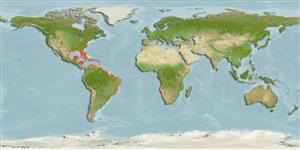Environment: milieu / climate zone / depth range / distribution range
Ökologie
seewasser riff-verbunden; tiefenbereich 2 - 50 m (Ref. 9710). Subtropical; 45°N - 34°S, 98°W - 34°W
Western Atlantic: Canada (Ref. 5951), Massachusetts (USA) to Brazil, including Bermuda, the Gulf of Mexico and the Caribbean. Mediterranean Sea (Ref. 50345).
Size / Gewicht / Alter
Maturity: Lm ? range ? - ? cm
Max length : 55.0 cm TL Männchen/unbestimmt; (Ref. 40637); common length : 30.0 cm TL Männchen/unbestimmt; (Ref. 5217); max. veröff. Gewicht: 3.3 kg (Ref. 40637)
With small diffuse white spots; two areas where the hexagonal plates are dark-edged, forming chain-like markings, one on the pectoral region of the body and the other half way between gill opening and posterior end of carapace; large individuals lose the pale spots and chain markings and develop an irregular dark reticulate pattern over the entire carapace and caudal peduncle (Ref. 13442).
Inhabits seagrass beds, coral rubble areas, and offshore reefs down to about 50 m. Feeds on a wide variety of small benthic invertebrates such as mollusks, crustaceans, worms and sessile tunicates, as well as some sea grasses (Ref. 3696). Highly esteemed food fish in the Caribbean (Ref. 3696).
Life cycle and mating behavior
Geschlechtsreife | Fortpflanzung | Ablaichen | Eier | Fecundity | Larven
Robins, C.R. and G.C. Ray, 1986. A field guide to Atlantic coast fishes of North America. Houghton Mifflin Company, Boston, U.S.A. 354 p. (Ref. 7251)
IUCN Rote Liste Status (Ref. 130435: Version 2024-2)
Bedrohung für Menschen
Reports of ciguatera poisoning (Ref. 4690)
Nutzung durch Menschen
Fischereien: kommerziell; Sportfisch: ja; Aquarium: Kommerziell
Tools
Zusatzinformationen
Download XML
Internet Quellen
Estimates based on models
Preferred temperature (Ref.
123201): 22.7 - 28, mean 25.5 °C (based on 450 cells).
Phylogenetic diversity index (Ref.
82804): PD
50 = 0.6250 [Uniqueness, from 0.5 = low to 2.0 = high].
Bayesian length-weight: a=0.03548 (0.01723 - 0.07305), b=2.81 (2.62 - 3.00), in cm total length, based on LWR estimates for this (Sub)family-body shape (Ref.
93245).
Trophic level (Ref.
69278): 3.3 ±0.3 se; based on diet studies.
Widerstandsfähigkeit (Ref.
120179): hoch, Verdopplung der Population dauert weniger als 15 Monate. (Fec assumed to be > 10,000).
Fishing Vulnerability (Ref.
59153): Moderate vulnerability (42 of 100).
Nutrients (Ref.
124155): Calcium = 21.6 [8.2, 68.6] mg/100g; Iron = 0.59 [0.29, 1.42] mg/100g; Protein = 19.1 [16.9, 21.3] %; Omega3 = 0.157 [0.081, 0.298] g/100g; Selenium = 20.9 [8.8, 45.9] μg/100g; VitaminA = 20.6 [5.1, 90.8] μg/100g; Zinc = 0.653 [0.415, 1.045] mg/100g (wet weight);
